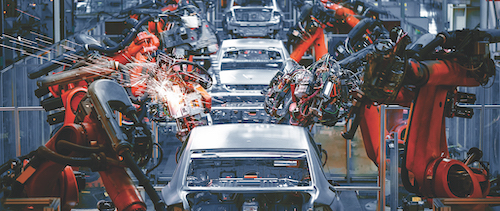Regulators are set to play a crucial role in curbing the potential dangers of robotics - but how confident can we be that these wise people are ready to hold the reins in this complex area?
The aviation and wider transport sector are our leading experts on safety and they tend to err on the side of caution. But are these regulators ready for the abundance of issues that will affect drones and self-driving cars? Cyber security, for instance, will become a crucial issue on our road and air highways. VIPs in particular could become targets in self-driving cars. If they have given away too much information about themselves in public, they could put themselves at risk of having their car controls taken over on the road by hackers.
And will regulators keep up with the more subtle developments of robotics? For example, without clear rules, we could see the frail and elderly deprived of human contact as AI is increasingly used to care for them. Similarly, regulators struggle to contain the development of surveillance at the moment - and could be taken unawares by the use of nearly invisible mini-drones in sophisticated espionage.
Recent regulatory issues do not bode well. Emissions-cheating technology is believed to have started to be used in auto manufacturer Volkswagen in 2008 - but was not exposed, despite clear warning signs, until seven years later.
To create and maintain adequate regulation, there are clear steps that need to be taken - investing in the system, for instance, developing flexibility and speed and educating the regulators themselves. Luis Franco - a lawyer at Perez-Lorca in Madrid who has a particular interest in robotics - says: ‘It is going to be a matter of governments investing enough resources so that they can keep ahead of people breaking the law.’
Speed of learning and response will be necessary to control the high-speed development of AI and robotics. Many countries will need to rethink their (time-consuming) reliance on parliament to bring in new rules. Spain, for instance, has bodies of experts which study certain areas of law and can fairly quickly draft amendments which are then presented to the Congress to be passed. Franco thinks that AI/robotics would need to call upon a similar panel in order for the sector to work effectively. He would also like to see the creation of ‘core regulations establishing the guiding principles (not subject to too many amendments)’ which would ‘clearly establish and authorise the amendment and detailed regulations of more technical-related matters to be governed by means of lower rank legal instruments’.
Looking at the issue more broadly, countries which rely on a civil code may also want to rethink their approach in this area if they do not want to be left behind by those that can use case law to give quicker responses through the law.
More resources and, perhaps, greater open-mindedness about the recruitment of regulators could bring more knowledge about the fields they oversee to regulatory panel. But the practical problems here can be immense, says Adam Samuel, a London-based expert in financial services compliance. ‘One would always like this,’ he says when asked if regulators should be better educated in their fields. He adds: ‘However, if regulators were that well resourced the cost would destroy the industry that they were regulating. Regulation is always a compromise in this respect.’
One of the complicating areas for regulators now is the range of aims being set for them. Some are under increasing pressure to take economic issues into account. Officials in Britain’s Office for Nuclear Regulation are said to be concerned at being told in 2014 to take into account a ‘duty to have regard to growth’ while regulating 37 nuclear sites, according to The Independent newspaper. Many regulators are very much aware that they can attract new business to their country by making their regulation attractive - and the World Bank’s ‘Doing Business’ tables (headed currently by Singapore) highlight this. The possible dangers of making regulation over-friendly may well increase on the back of growing globalisation. ‘There is always a risk of regulator-capture by the big players in any industry.’ says Adam Samuel. ‘On top of that, the threat to move businesses to the least regulated venue has been with us for much of the last hundred years. Revolving door set ups create similar risks.’
In a complicated world, there are some optimistic signs, however. technology can provide answers to many questions that regulators will ask. Anti-collision technology, for example, will make drones safer and could do away with the need for pages of rules. In an interview with Robotics Law Journal (published in this issue), Lisa Ellman, co-chair of the Hogan Lovells global UAS group, speaks of ‘polivation’ as a way forward. She says: ‘As we are now seeing the potential policy implications for drones, we have a lot of innovators who are developing solutions. I call what we are seeing “polivation”: policy-makers promote innovation and innovators work hand in hand with policymakers.’ And Luis Franco makes a similar point, calling for regulators who understand mass data processing and other IT issues. But he also wants the industry to play its part. He says: ‘You will need to have designers who have some knowledge of law.’
Regulation/Box
One of the main areas where regulators and law-makers will find themselves looking at issues around robotics is that of setting a minimum wage. ‘If you raise the minimum wage, you're going to make people more expensive than a machine,’ said Marco Rubio, one of the Republican candidates for the presidential nomination in a debate in November with other candidates. ‘And that means all this automation that's replacing jobs and people right now is only going to be accelerated.’ Mr Rubio might not have taken the issue through to its logical conclusion in this debate but the fact that he makes these comments in the hustings shows just what an important subject it is with the public.
In the UK minimum wage rates have erupted as a major issue over the last year (albeit slightly disguised in the form of a national debate on a subsidy, Tax Credit, which many of the low-paid receive). Views have been polarised on the topic. There is little disagreement over the fact that the gap between rich and poor has accelerated in the last decade. For example, the Sunday Times Rich List of the wealthiest 1,000 people showed that they were twice as well-off as they had been a decade before. But there are apparently irreconcilable disputes about how low pay should be handled.
Regulators are involved in more subtle ways than just setting the minimum rate. Enforcement of the minimum wage is an area that can easily be neglected by governments which allocate few resources to this cause. Enforcers in the UK, for example, have been handing out penalties which average just £685 to employers which are caught paying under the minimum wage. By contrast, the financial services regulator, the Financial Conduct Authority, hits its targets much harder. Fines in the millions are common. The Bank of New York Mellon was given a record penalty in 2015 when it was fined £126m for not keeping client accounts fully separate from the bank’s own money.


.jpg)
.jpg)
.jpg)

.jpg)
.jpg)



